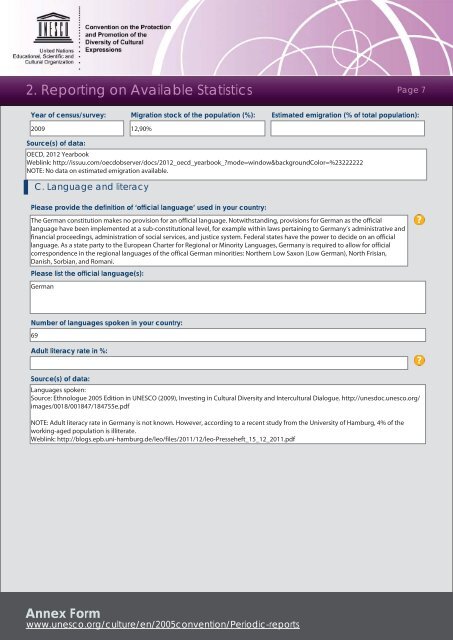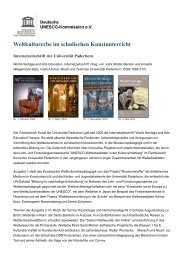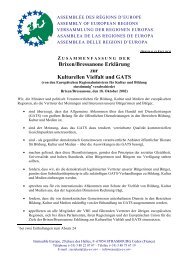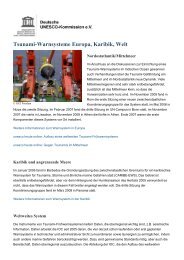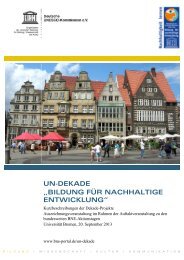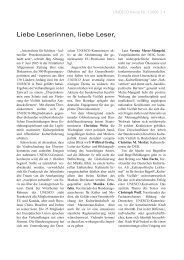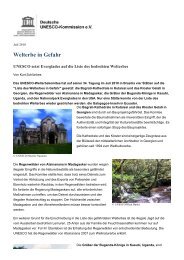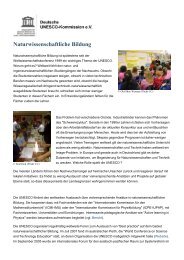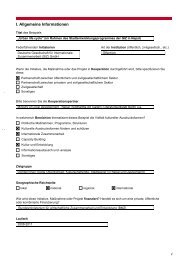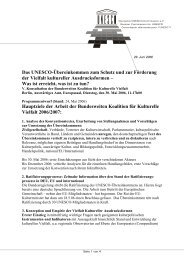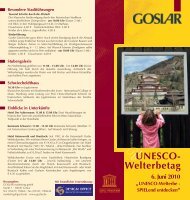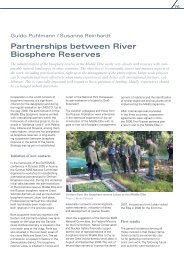Annex Form - Deutsche UNESCO-Kommission
Annex Form - Deutsche UNESCO-Kommission
Annex Form - Deutsche UNESCO-Kommission
You also want an ePaper? Increase the reach of your titles
YUMPU automatically turns print PDFs into web optimized ePapers that Google loves.
2. Reporting on Available Statistics<br />
Year of census/survey:<br />
2009<br />
Migration stock of the population (%):<br />
12,90%<br />
<strong>Annex</strong> <strong>Form</strong><br />
www.unesco.org/culture/en/2005convention/Periodic-reports<br />
Page 7<br />
Estimated emigration (% of total population):<br />
Source(s) of data:<br />
OECD, 2012 Yearbook<br />
Weblink: http://issuu.com/oecdobserver/docs/2012_oecd_yearbook_?mode=window&backgroundColor=%23222222<br />
NOTE: No data on estimated emigration available.<br />
C. Language and literacy<br />
Please provide the definition of ‘official language’ used in your country:<br />
The German constitution makes no provision for an official language. Notwithstanding, provisions for German as the official<br />
language have been implemented at a sub-constitutional level, for example within laws pertaining to Germany’s administrative and<br />
financial proceedings, administration of social services, and justice system. Federal states have the power to decide on an official<br />
language. As a state party to the European Charter for Regional or Minority Languages, Germany is required to allow for official<br />
correspondence in the regional languages of the offical German minorities: Northern Low Saxon (Low German), North Frisian,<br />
Danish, Sorbian, and Romani.<br />
Please list the official language(s):<br />
German<br />
Number of languages spoken in your country:<br />
69<br />
Adult literacy rate in %:<br />
Source(s) of data:<br />
Languages spoken:<br />
Source: Ethnologue 2005 Edition in <strong>UNESCO</strong> (2009), Investing in Cultural Diversity and Intercultural Dialogue. http://unesdoc.unesco.org/<br />
images/0018/001847/184755e.pdf<br />
NOTE: Adult literacy rate in Germany is not known. However, according to a recent study from the University of Hamburg, 4% of the<br />
working-aged population is illiterate.<br />
Weblink: http://blogs.epb.uni-hamburg.de/leo/files/2011/12/leo-Presseheft_15_12_2011.pdf<br />
?<br />
?


